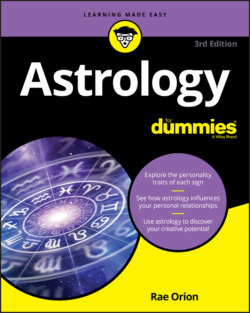Читать книгу Astrology For Dummies - Rae Orion - Страница 47
WAS AUGUSTUS A CAPRICORN?
ОглавлениеHe was not, although he liked the symbol. The Roman historian Suetonius reports that Augustus was born before sunrise on September 23 in 63 BCE. Do the chart for that day, and you will see that Augustus was a Virgo (not a Libran) with the Moon in Capricorn. But astrology in those days did not rise and set with the Sun. Other planets were equal in importance. So his allegiance to Capricorn could allude to his Moon sign. Or it could be a nod to his conception, an event Roman astrologers deemed to have occurred 273 days prior to birth, in which case Augustus would have been conceived in late December — in Capricorn. Or maybe Augustus just wanted to capitalize on the imperial grandeur of Capricorn. Perhaps his regard for the sea-goat was a form of branding. The seventeenth-century astronomer Johannes Kepler, who was a full-fledged astrologer, investigated the matter for Emperor Rudolph II, hoping to figure out why the emperor favored the sign. He never reached a conclusion, and scholars are still mulling it over.
After Augustus came Tiberius, whom Pliny the Elder considered “the gloomiest of men.” Tiberius believed in astrology but didn’t trust astrologers, so he tested them. He and the astrologer, accompanied by a powerfully built freedman, would climb to the top of a cliff high above the sea where the astrologer would interpret his chart. If Tiberius felt deceived or dissatisfied, the freedman pitched the astrologer over the cliff.
So when the astrologer Thrasyllus was asked to give a cliff-side consultation, he predicted a glorious future for Tiberius. Then the emperor asked how he saw his own prospects. Tiberius cast a chart and, trembling, exclaimed that a perilous, possibly fatal crisis was looming over him. Tiberius, who knew this to be true because he was indeed thinking about that cliff, congratulated the astrologer on his perspicacity and embraced him as a member of his household. They became close friends but after a while, Tiberius started to lose faith. One day, as he and Thrasyllus strolled along the cliff, the astrologer spotted a distant ship and announced that it would bring good news. For once, he was right: “a lucky stroke,” says Suetonius, “which persuaded Tiberius of his trustworthiness.”
The reality was that most Romans believed in astrology, but they associated it with the heavy hand of fate. So it fascinated and frightened them, and from time to time they acted on that ambivalence. On at least eight occasions between 139 BCE and 175 CE, disgruntled dignitaries expelled astrologers en masse (even if they found ways to allow their personal seers to remain). Belief in astrology was almost universal. But astrologers had no job security. They were always on probation.
